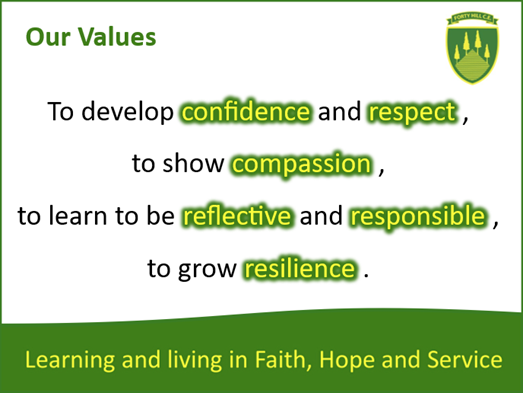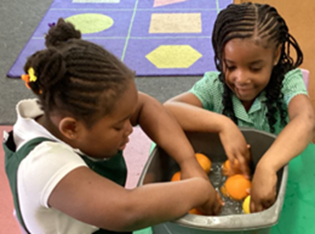Relationships and Conduct
At Forty Hill CE School, we believe that every member of the school community is of equal importance in the eyes of God. Our school’s theologically rooted Vision and Values, which are agreed by pupils, staff, parents and governors, allow us to work in harmony with one another and ensure safety and wellbeing for all within the school community.
Furthermore, we believe that the establishment of a good learning environment both within and outside the classroom is key to effective education. Effective teaching and learning is dependent on positive relationships established at a school and classroom level through interactions between staff and pupils and between pupils themselves. We believe it is crucial for parents to embrace, and model, our school values and appropriate conduct.
At Forty Hill, our mission is to foster a Christ-centred community where each child is nurtured, valued, and encouraged to flourish. We believe in building positive relationships based on Christian values of love, respect, compassion, and forgiveness. Our Relationships and Conduct Policy outlines our approach to maintaining a supportive and safe environment for all students, integrating Restorative Justice principles and Trauma-Informed Practices.


Our Positive Behaviour Ethos
Children have to learn positive behaviour and the ability to self-regulate, this includes learning frotheir mistakes. Consistency and a supportive environment is the key to success.
At Forty Hill:
Aims
- To promote a positive and inclusive school culture rooted in Christian values.
- To address conflict and conduct issues through restorative and supportive means.
- To recognise and respond to the impact of trauma on student behaviour and well-being.
- To create an atmosphere of mutual respect, trust and responsibility
- To build self-esteem and positive attitudes to ensure that all pupils feel of equal value
- To build a culture of self-regulation and emotional literacy.
- To promote a positive school ethos through supportive behaviour strategies and celebrations of children’s successes across their school life.
- To work collaboratively with parents, pupils and staff in setting expectations of relationships and conduct within the school
- To take firm action against bullying, racism, homophobia or any kind of derogatory conduct towards protected characteristics.
- To develop pupils’ awareness of Christian and British values to enable them to understand their role in the world they live in.
At Forty Hill:
- We set clear and consistent expectations in a positive way
- We support our children using the Zones of Regulation and the toolkits associated with each zone
- Where appropriate, we encourage our children to use their individualised toolkits independently
- We focus on identifying the root cause for the poor relationship and conduct, and support children to make amends and move forward, learning from this experience. This includes considering reasons for poor conduct and relationships through trauma informed practice.
- We recognise, praise and reinforce appropriate behaviour
- We allow time for children to calm down and regulate following an incident before having a restorative conversation.
- We encourage the child to seek help and ensure that they always know who is available to help them (e.g. friend, duty staff, class teacher, pastoral lead, senior staff, Vicar)

Working in partnership with parents
We recognise that parents have a considerable influence upon their child’s relationships and conduct and play a vital role in ensuring their child is able to have a successful and positive day at school. We know that establishing an effective working partnership will positively affect standards of relationships and conduct.
At Forty Hill:
- All members of the school community are expected to respect each other and show consideration for others beyond themselves
- Parents should encourage their children to respect and value each other, school staff, equipment and God’s world
- Parents have a responsibility to ensure their children do not bring any potentially dangerous objects to school that could harm themselves or others, including food items that could result severe allergic reaction.
- Parents should ensure their children understand that they must remain on the school grounds during the normal school hours
- Parents should model our school Vision and Values when interacting with each other, staff and pupils.
- We are aware that parents occasionally hear ‘snippets’ of the school day that are not always in context or reflective of the full events of a situation. We aim to communicate the ‘full picture’ through open dialogue and positive relations that harbour parental trust in the school system to proactively resolve issues.

Positive Behaviour Strategies
The following is a guide to some of the positive behaviour strategies the school staff and pupils can employ to reward, recognise and encourage positive behaviour. These cover all aspects of school life so it is possible for all children to achieve a school award:
- Awarding values, achievement and star of the week certificates, table/group points, house points, Values awards/nominations, certificates and stickers, including our values stickers, for positive behaviour and achievement in areas across the curriculum and out of school
- Use of PSHE, ‘Circle Time’ and Philosophy for Children (P4C) to discuss aspects of personal and social development including positive and negative behaviour
- Religious Education lessons to discuss Christian Values, the teachings of Christ and tolerance and respect of others’ beliefs or non-belief
- Discussing whole school conduct issues at School Council meetings
- Consistent use of positive praise by all staff as a sincere and prompt response to positive behaviour or achievement
- ‘Good News’ postcards sent home to share good choices and achievements
- Giving positive feedback to individuals about their work/behaviour and commending behaviour to the whole class
- Showing work to others, including older children, other teachers and the headteacher
- Whole school Collective Acts of Worship on the School and British Values, the teachings of Christ and moral and social issues
- Setting of personal and class targets for improving work and/or behaviour

.Restorative Justice Approach
Restorative Justice is central to our approach in managing behaviour and relationships within the school. We focus on repairing harm, restoring relationships, and reintegrating students into the school community. Key elements include:
- Restorative Conversations: When conflicts arise, students involved will engage in facilitated discussions to express their feelings, understand the impact of their actions, and work towards reconciliation.
- Circle Processes: Regular circle times will be held to build community, strengthen relationships, and address issues collaboratively. Circles encourage open dialogue and shared responsibility.
- Repairing Harm: Students who cause harm are supported in understanding the impact of their actions and are guided to make amends, This may include a restorative act to repair the harm caused.
- Reintegration Support: For students who have been involved in serious conflicts or have faced disciplinary action, we provide a structured reintegration plan to help them reconnect with their peers and continue their education in a positive manner.
Trauma-Informed Practices
Recognising that some students may have experienced trauma, we are committed to adopting practices that acknowledge and address the impact of trauma on behaviour and learning.
Our approach includes:
- Safety and Trust: We create a physically and emotionally safe environment where students feel secure. Clear expectations, consistent routines, and trustworthy relationships are emphasised.
- Empathy and Understanding: Staff are trained to recognise signs of trauma and respond with empathy. We understand that behaviour may reflect past experiences and focus on understanding the underlying causes rather than solely addressing symptoms.
- Collaborative Problem-Solving: We involve students in decision-making processes, giving them a voice in how conflicts are resolved and in the development of strategies to support their well-being.
- Flexible Support: Individualised support plans are developed for students affected by trauma. This may include counselling, mentoring, or adjustments in the classroom environment to meet their needs.
-Children’s poor conduct is never highlighted publicly e.g standing them up or writing their name in public view, conversations and reminders are discreet and calm
-School staff must ensure they are regulated prior to having a conversation about conduct with a child. Conversations about conduct should be addressed calmly with both staff and pupils feeling regulated.
-We strive to be a ‘no shouting’ school. Adults are role models for self-regulation and calm.
